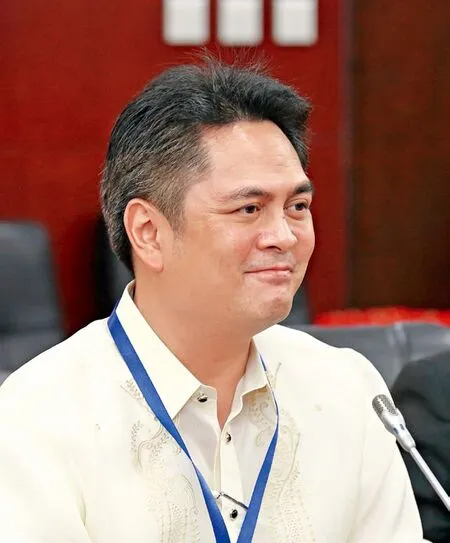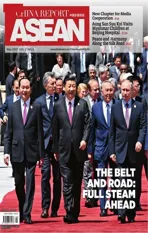TOWARDS A SHARED VISION
2017-07-18By
By
TOWARDS A SHARED VISION
ByWang Yufan
Secretary of the Philippines’ Presidential Communications Operations Office Martin Andanar on Sino-Philippine media cooperation and the Belt and Road Initiative
While leading a media delegation on a visit to China early in May, Jose Ruperto Martin Marfori Andanar, Secretary of the Philippines’ Presidential Communications Operations Office, sat down for an exclusive interview with China Report ASEAN in Nanjing, capital of southern China’s Jiangsu Province.
>> China Report ASEAN: Mr. Secretary, you and your delegation have just visited several Chinese news agencies including Xinhua News Agency, China Radio International (CRI), China Central Television (CCTV) and China International Publishing Group (CIPG) based in Beijing, as well as a few media groups here in Nanjing. Could you please talk about your impression of these organizations and the Chinese media industry overall?

Jose Ruperto Martin Marfori Andanar, Secretary of the Presidential Communications Operations Office of the Philippines.
Secretary Andanar:First of all, I would like to extend my gratitude to President Xi Jinping, and to the officials of the Chinese government for actively seeking our cooperation and asking us to act on the agreements and scholarships that the Chinese government has offered to the Philippine state media.
We have learned so much valuable information and techniques in managing our television, radio and online media. CCTV has opened our eyes that, indeed, a very well-run state television is possible. The introduction of the management principles of the Xinhua News Agency has also broadened our minds that there is indeed an opportunity for the Philippine News Agency to grow beyond what it is right now. The CRI has also given us hope that our national radio will have a chance to compete with other radio stations not only on the domestic front, but also internationally. In addition, CIPG has inspired us to establish a publishing group within the Philippine government.
It is very important for me to mention that visiting the Chinese state-run media organizations gave us the idea that history is very important. In all of these organizations, there is an area or hall illustrating the corporate history. As they say, you cannot move forward if you do not know your history. The history of an organization should serve as inspiration for future generations to further develop the organization.
We also learned more about Chinese international politics and international relations that have grown from the times of Chairman Mao Zedong to the current leadership of President Xi Jinping. Now, we have a better grasp of the issues that are confronting the Chinese government, which will make it easier for us in the media to help our citizens understand what the challenges the Chinese government is facing.
>> China Report ASEAN: Last year, the Presidential Communications Operations Office (PCOO) of the Philippines and the State Council Information Office (SCIO) of China signed a memorandum of understanding on media cooperation. So, what are your plans to deepen bilateral cooperation in this field?
Secretary Andanar:The MOU is a people-to-people and cultural initiative carried out by the governments of both countries . We’ve learned about the culture and history of the SCIO, and will also learn from its technology, management and development strategies.
China is open to the Philippines coming here to produce a documentary and other forms of communication for our people to understand what China is currently doing. China also encourages its citizens to travel to the Philippines to learn about our culture. Now that we have signed the MOU, we will work with the Chinese media to share content from both sides. When the Chinese government media givesus the airtime, print space or presence online, there’s a much greater chance for the Chinese to understand the Philippines, and vice versa. Establishing such a communication base is imperative for the producer and the audience to speak to one another, and for one country to speak to another. Once the communication is open, dynamic and transparent, ties between both countries will be strengthened, and an environment of mutual trust will be created.
>> China Report ASEAN: Media connectivity and cooperation is also part of China’s Belt and Road Initiative (BRI). The Philippine president recently said that China’s BRI is boosting the development of neighboring countries, and that ASEAN will play a major role in the Belt and Road construction. So, how would you view the BRI from your perspective?
Secretary Andanar:From our own perspectives in the Philippines, the BRI proposed by China is inviting many countries around the world to develop together, particularly in terms of economics and trade. It lends a huge opportunity for our country to catch up in our region, and finally become a “tiger economy”.
The BRI is a realization of the dream to relaunch, and show to everyone, the old Silk Road that Marco Polo and other explorers and traders of Kyrgyzstan, Turkestan, Pakistan and India traveled from East Asia to Europe, as well as the ancient maritime trading route linking China with the rest of the world. The initiative is set to reshape the development of the global economy. It is a testament that growth does not go in a single direction — it is not only from the Western side, but can also spring from the Eastern side of the world.
The Philippines embraces China’s BRI, and has established a deeper, more cooperative and more dynamic relationship with the Chinese government. The Philippines lies in the middle of the Maritime Silk Road, between China and the rest of the world. It is of great interest to us to deepen cooperation with China, not only as neighbors, but also as brothers. Because in the end, as they now say, when China sneezes, everyone catches a cold.
This year, the Philippines holds the rotating chair of ASEAN, which is celebrating its 50th anniversary. ASEAN is growing as a regional organization that is very united, and all its members respect each other’s political nuances and uphold the spirit of nonindifference. As an ally of China and the chair of ASEAN, the Philippines has a certain influence in the crafting of multilateral agreements that will be carried out during the ASEAN summits this coming autumn. We will also show other ASEAN countries that China is not here to be belligerent, or to fight the rest of the world. Rather, China is here to share as a volunteer, and to ensure that prosperity is not only for the Chinese, but for all.
>> China Report ASEAN: Just a couple of days ago Chinese President Xi Jinping spoke on the phone with President Rodrigo Duterte, acknowledging the role of the Philippines as a friendly neighbor and a major partner in the Belt and Road construction. Next week, Beijing will host the Belt and Road Forum for International Cooperation, and President Duterte will attend the event. What are your expectations on this forthcoming forum?
Secretary Andanar:The Philippines has gained from the more than US$24 billion that China has committed to our country in our economic development, and further billions are coming from the private-public partnerships between the Philippine government and private Chinese companies. The President’s presence at the Forum is a sign of the Philippines’ commitment and sincerity, as well as its drive to develop a genuine, deep relationship with China.
President Duterte’s attitude toward foreign policy is as follows: we strive to be independent, and we strive to be the friend of all and enemy to none. The opening of the window to be a friend of China is an unprecedented policy as far as the Philippines is concerned, especially if we look into the policy of the past administration. Therefore, President Duterte’s move to be a friend of China is paying off. More and more people in our country and in neighboring countries are realizing the wisdom of that decision made by the President to open the economic gates of the Philippines to China.
